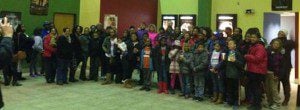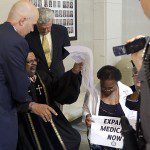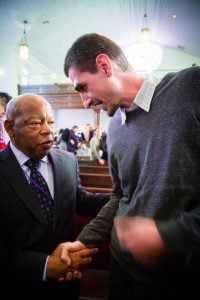 Some years ago, when George W. Bush was president and some folks from Christian Peacemaker Teams were being held hostage in Iraq, Leah and I spent this first weekend of Epiphany across the street from the White House, keeping vigil and to “shine the light” on the Iraq War. January nights in DC are long and cold. Of course, the lights never go off at the White House. But by early Sunday morning, I felt like for my whole body aching for the light of the rising sun.
Some years ago, when George W. Bush was president and some folks from Christian Peacemaker Teams were being held hostage in Iraq, Leah and I spent this first weekend of Epiphany across the street from the White House, keeping vigil and to “shine the light” on the Iraq War. January nights in DC are long and cold. Of course, the lights never go off at the White House. But by early Sunday morning, I felt like for my whole body aching for the light of the rising sun.
To begin the Epiphany weekend this year, I took my son with about 120 other young people of color to opening night of the Selma movie here in Durham. Folks from our church, Walltown Aspiring Youth, and other afterschool and mentoring programs around town thought it important for our young people to see how, fifty years ago, thousands of people put their lives on the line in Alabama so that black people might gain the franchise they had been promised a century earlier. On the big screen, they saw the truth that no one gave black people the Voting Rights Act. They and their white allies had to stand together and demand it in the name of all that is good and just.
When the movie ended, a young black man wearing a knit sweater and glasses stood up to say that what had happened then is happening now—black people are standing up to demand that their lives matter. Police cannot shoot young black men with impunity. Young people like those we’d brought to the theater must not expect to be chased down and sent to prison. No, black lives matter, he said. And everyone needs to know it.
Several dozen of our kids followed this young man into the hallway of the theater where people were leaving other films and coming in for the next ones. Right there in the middle of the walkway, they lay down together for four and half minutes, reminding anyone who would listen that police left Michael Brown’s body lying uncovered on a street in Ferguson, MO for four and half hours.
Then, like well rehearsed actors on a stage, they stood together and started chanting, “If we don’t get it, shut it down! If Mike don’t get it, shut it down! If Eric don’t get it, shut it down! If Tamir don’t get it, shut it down!”
The “it” they were demanding was clear: justice. But what “it” were they planning to shut down? Not the theater. They marched out nonviolently, pausing outside to make clear to the kids that anger is necessary, but that it must be directly toward work for systemic change. They were interrupting business as usual, but they were also paying customers.
The biblical text for the first Sunday of Epiphany is the opening of the creation story in Genesis. “In the beginning,” it says—before God spoke anything into existence—“the earth was formless… and darkness covered the face of the deep.” When God shined a light in that darkness, Genesis says he saw that it was good. The light drove out the darkness. You might even say it “shut it down.”
God was not finished after the first day of creation. Once the light had shone, there was other work to be done. But first, the light had to shine. Because only light can drive out darkness. And, as Dr. King said half a century ago, it’s often in our deepest darkness that we learn which lights shine brightest.
For Epiphany this year, small groups of folks around the country are reading Free to Be Bound, a book I wrote years ago about my own journey to understand America’s history of race and how God speaks hope into that deep darkness. As I pray with those groups—and you—through this season, I’m asking God to make this a #RacialJusticeEpiphany for America. This will mean, no doubt, many painful conversations about our past, about real hurts that people have experienced, and about savage inequalities that persist today. But I believe that both Genesis and my son’s cohort from Friday night are right about this: our epiphany must begin with the light of truth driving out darkness, forcing us to see things many would rather ignore.











